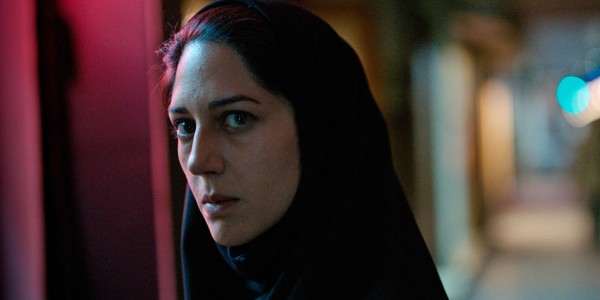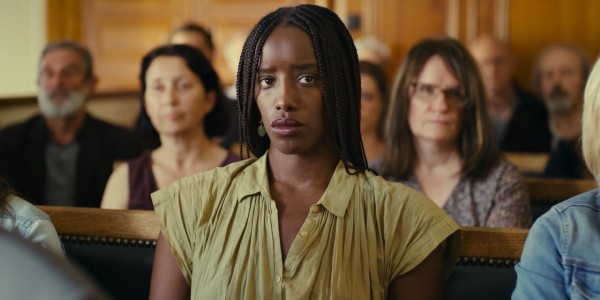London Film Festival 2022: HOLY SPIDER, SAINT OMER & LIVING

All I know is that Oscar Isaac would make a…
The London Film Festival rolls on. Our latest review round-up covers stories of real life and of people starting to really live, with films from Iran to France and the festival’s home turf: London. Read on for our second despatch from the festival…
Holy Spider (Ali Abbasi)

Daryl McDonald: Ali Abbasi’s Holy Spider could not have been more timely. As conflict rages on in Iran concerning the death of Mahsa Amini, Holy Spider reminds us of another tragedy in Iran’s recent past. This one concerns the violent murder spree of Saeed Hanaei, who killed 16 sex workers between 2000-2001. Believing himself to be on a divine mission from God to cleanse the holy streets of Mashhad from immoral women, Hanaei would pick them up under the pretence of engaging their services, then take them to his home where he would strangle them to death before rolling their bodies in carpet and dumping them in the street.
Abbasi’s intent with Holy Spider is to highlight how a patriarchal, theocratic state such as Iran can lead to the dehumanisation of women. His chief protagonist, the fictional journalist Rahimi, is constructed as a way to confront men with a progressive figure that they would rather ignore. As Rahimi investigates the escalating number of deaths in Mashhad she is met with indifference. At one point she asks someone why the police haven’t been called. Why would the police care, she is told; he is doing their job for them.
Misogyny imbues almost every frame of Holy Spider. Police officers threaten to rape Rahimi if she persists; a hotel manager refuses her a room as she is unmarried; an historic incident where Rahimi filed a sexual harassment claim against her former boss dogs her wherever she goes, seeing her labelled a slut by total strangers. Elsewhere, Hanaei’s careless, slapdash tactics for killing these women would see him apprehended almost immediately in any western country, yet in Iran no one seems to ask questions about a man’s whereabouts, nor does forensic technology appear advanced enough to catch him out when the bodies (which he handles without gloves) start to pile up.
Abbasi’s style for Holy Spider is somewhat exploitative and confrontational. The first scene alone sees a topless prostitute applying her make-up. For an Iranian movie this feels shocking, and sets a tone for what’s to come. It feels incongruous within the backdrop of an ultra-conservative state like Iran to have such a pulpy, noirish thriller, yet Abbasi’s shock and awe approach works well, jolting the viewer out of any passivity.
Mehdi Bajestani gives a muscular performance as the stoic Hanaei, full of coiled anger, while Zar Amir-Ebrahimi is more than his equal as the determined, frustrated Rahimi. As Holy Spider reaches its chaotic apex, Rahimi increasingly circling Hanaei, the tension notches up towards a satisfying conclusion. Abbasi’s message is never lost throughout this, particularly at the denouement where there is a question of legacy, and a final frame which is very, very chilling.
Saint Omer (Alice Diop)

Paddy Wilson: Documentary filmmaker Alice Diop’s first feature film, Saint Omer, is an oblique but fascinating courtroom drama, telling the story of Rama (Kayije Kagame), a young writer who attends the trial of a mother accused of murdering her daughter.
Based on a real court case from 2016, which Diop attended, far from abandoning trappings of documentary filmmaking, cinéma vérité is present in Saint Omer in style and content. This is a stylistically sparse film with long, simple static shots of the trial, as though ripped from the internal courtroom camera system. But it’s also a film about vérité: truth. Unlike her camera, the ‘truth’ here is unfixed. There are the facts which, Laurence, the accused mother (Guslagie Malanga) doesn’t dispute. But then there’s the why, which Laurence herself wants to understand. Malanga’s performance as the accused has a still ferocity, her movements sparse but the maelstrom of inexplicable emotions broiling beneath, visible only through her steady, strong gaze.
Rama’s troubles aren’t as explicit or explained, but the emotions that gradually come to the surface have a similar strength. Rama and Laurence are Black women, with African backgrounds, living in France. Laurence was born in Senegal, later moving to Paris by herself, while Rama was born in France. It’s reductive, and – as Laurence’s university teacher, acting as a witness, demonstrates – ignorant to assume one Black, African woman would understand or feel innate sympathy for another because of those two characteristics alone.
But as Laurence tells her story, it resurfaces hard memories in Rama and magnifies ongoing troubles with her family. Interestingly, when we see some of those moments in flashback, it’s as though we see them just before and after the painful moments in question – not unlike the trial – making the truth even harder to get at.
Diop doesn’t ask us to feel sympathy for Laurence, who accepts her guilt at all times. But she invites us to listen and, perhaps – as in the defence’s closing statement, delivered straight-to-camera – asks us to come to our own judgment on the themes the film raises, from responsibility and culture to social invisibility.
Intense and moving, with a cruel but beautiful use of Nina Simone’s Little Girl Blue, Diop’s documentary style lets Saint Omer’s sensitive subject unfold with maximum impact – helped along the way by natural and emotionally-charged performances.
Living (Oliver Hermanus)

Paddy Wilson: Long live Bill Nighy. This isn’t the sentiment of the illness that befalls Nighy’s bureaucrat in director Oliver Hermanus’ Living. But it is mine, as Nighy elevates this borderline saccharine remake of Akira Kurosawa’s 1952 classic, Ikiru.
Nighy plays Mr Williams, a dull civil servant (nicknamed ‘Mr Zombie’ by a co-worker) in early 50s London. When his doctor tells him he has little time left, he tries to start properly living. Kurosawa’s 1952 classic was inspired by Tolstoy’s story The Death of Ivan Ilyich. Taking the ‘carpe diem’ premise, the master of Japanese cinema made it contemporary and relevant to modern audiences. Living, however, opts for a straightforward remake of the Kurosawa film, switching Tokyo for London but retaining most else.
Scripted by Booker and Novel Prize-winning novelist Kazuo Ishiguro, there’s something that feels quite British about stuffy pencil pushers living lives of quiet despair, so the choice works. But it’s hard not to wonder how a modern version of this story might look: what job in 2022 might best symbolise a life stifled and ground down?
The period is well evoked, opening with stock footage that moves seamlessly into that saturated 50s film stock look, with some wah-wah Glen Miller-style swing tossed over the top for good measure. Emilie Levienaise-Farrouch’s score is lush, as rich as shortbread sandwiched with ganache. At moments the score, alongside similarly slick camera moves, feels slightly compensatory for a slight script, but the overall impression is so sweeping it’s hard not to get swept up.
But there’s a sweetness alongside the richness. If Ikiru is the recipe handed down by the grandfather, Ishiguro’s script, Hermanus’ direction and the supporting performances add more sugar to the mixture. Aimée Lou Woo’s performance as Miss Harris is an honourable exception, playing it completely straight, providing a natural pep. The added sweetener results in a saccharine aftertaste that’s a touch too much for my taste, though on another day – and with most audiences – will go down smoothly.
To unnecessarily extend the recipe metaphor, the binding agent is Nighy’s moving, understated performance. He’s as endearing as he is in Pride, as dry as in Shaun of the Dead and as loveable as in About Time. Throw in Tom Burke, in a version of the role he’s played in The Souvenir and True Things — the larger than life character who helps reluctant people live it — and you can’t have many complaints.
Not quite able to stand alongside Kurosawa’s Ikiru, Nighy’s performance swings enough in its favour.
Does content like this matter to you?
Become a Member and support film journalism. Unlock access to all of Film Inquiry`s great articles. Join a community of like-minded readers who are passionate about cinema - get access to our private members Network, give back to independent filmmakers, and more.













